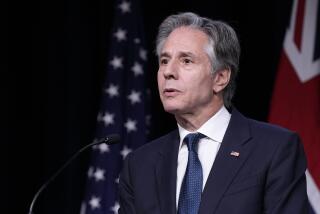Israeli Armed Forces Ban Discrimination Against Gays : Rights: Order allows homosexuals to serve in elite units, posts requiring special clearance. Activists cheer the move.
- Share via
JERUSALEM — Israel’s armed forces declared Friday that they would not discriminate against homosexuals and would allow them to serve in elite units and other posts requiring top security clearances.
Although characterized as a restatement of Israel Defense Forces’ policy, the new order is intended to end discrimination against homosexuals by unit commanders and to assure them equal opportunity to serve in all positions, a military spokeswoman said.
“The new order determines that no limits are placed on the induction of homosexuals into the Israel Defense Forces, and that they are to be inducted according to the same criteria that apply to all candidates,” the military said. “The order also says there is no automatic restriction on the service of homosexuals in special jobs, and the case of each candidate for a classified job will be checked in the same way.”
Civil rights campaigners and gay activists welcomed the declaration as representing the full acceptance of homosexuals in Israel’s armed forces, one of the country’s most important national and social institutions.
“This makes Israel one of the most advanced nations in the world with regard to homosexual rights,” said Hadar Namir, a lobbyist for Otzma, a homosexual political action group. “I think this will be a significant contribution to gay liberation internationally as well.”
Liora Moriel, chairwoman of the Society for the Protection of Personal Rights for Gay Men, Lesbians and Bisexuals in Israel, said she hoped that the Israeli example would “help President Clinton make homosexuality a non-issue in the U.S. military” when he addresses the question next month.
Yael Dayan, a member of Parliament from the governing Labor Party and the daughter of the late Moshe Dayan, who led Israeli forces in the Six-Day War in 1967, said the new directive includes all the changes that she and other civil rights campaigners wanted.
“Now there will be no exceptions made on the basis of sexual orientation,” Dayan said. “The old order was not that awful, but there were a few things we wanted to fix. The new version (that we presented) was accepted in its entirety.”
The armed forces’ previous standing order, drafted in 1986, said: “The placement of homosexual soldiers in regular, career and reserve service, as well as civilian employees, will be limited because of their (sexual) orientation. This is because the aforementioned orientation is likely to be a security risk.”
It also declared that “under no circumstances will homosexual soldiers or civilian employees be employed in top-secret positions, in the intelligence community or in coding (communications) positions.”
And it added, “Soldiers or civilian employees about whom there arises a reasonable suspicion of homosexual orientation will be placed under security surveillance for the duration of his service or employment.”
The new order, in contrast, opens with the statement, “In recognition that homosexuals are as worthy of military service as others, the Israel Defense Forces inducts those with this orientation on the condition that they be found fit for service according to the same criteria according to which all other candidates are inducted.”
“This is one of the most wonderful things that could have happened to the (gay) community,” said Danny Lachman, a gay rights activist. “That homosexuals were drafted was always important to me--it gave a feeling that we were, after all, part of society. That’s especially important at that age.
“This step, however, really opens doors--we won’t have to be just gardeners, clerks and medics any longer. It removes the stigma and the stereotypes that we can’t stand up under pressure, that we are easy marks for blackmail.”
Although the Israeli military does not question conscripts about their sexual orientation on induction--most Jewish men and women are drafted at the age of 18--the issue can arise during the psychological testing and security checks required for elite units, advanced training and special assignments.
Homosexuals, moreover, were often put through a separate evaluation process to assess their “emotional strength” and “ability to withstand pressure.” And some commanders would simply transfer out of their units any soldiers they suspected of being homosexual.
“I think that everyone who felt forced to keep his or her homosexuality a secret will now be able to be open about it,” the army spokeswoman said.
The testimony of Uzi Even before Dayan’s committee contributed more than any other factor to the reassessment of the army policy toward homosexuals. Although he had done highly secret research for the military for 15 years and served as an intelligence officer during the 1967 and 1973 Arab-Israeli wars, he was denied promotion and given clerical work after his homosexuality was discovered.
Times researcher Emily L. Hauser in Jerusalem also reported for this story.
More to Read
Sign up for Essential California
The most important California stories and recommendations in your inbox every morning.
You may occasionally receive promotional content from the Los Angeles Times.













